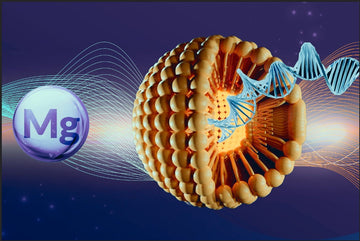

Overcoming Magnesium Deficiency and Its Symptoms with Liposomal Magnesium Supplement
Table of Contents
Magnesium is a powerful mineral that many of us have started hearing about everywhere in the health field. While it’s known as a cure for stressbusting and weight loss. Magnesium is found in abundance in natural foods, and it is often praised as a super mineral, with some of the health benefits ranging from stress relief to bone strengthening. However, getting a liposomal magnesium supplement is an additional option to consider.
In this blog, we will explore the various functions of magnesium on our body, the signs of magnesium deficiency, and finally, whether you need any liposomal magnesium supplement.
Magnesium For Well-Being
Magnesium plays a crucial role in hundreds of biochemical reactions, supporting functions like:
Bone health: It works with calcium to make bones stronger.
Brain function: Sometimes in our hectic and fast-paced life, our mental health deteriorates, and our mood becomes unstable. This may lead to depression that can be potentially reduced with the use of melatonin.
Blood sugar control: The breakdown of the sugars in your body for improved regulation of your weight becomes easier to accomplish with the help of prebiotics.
Sleep regulation: It helps in treating the most imbalanced hormones that affect sleep and the wake-up cycle.
Muscle function: It protects the muscle supply from unwanted stimuli and even possibly arrhythmias.
Metabolism: Contributes to the breakdown of sugars which is very vital for weight management.
Hormonal Balance: Helps in sleep management by regulating sleep patterns and circadian rhythm.
Digestive Health: Enhances your digestion.
Symptoms of Magnesium Deficiency
When suffering from Magnesium deficiency, the person can experience the following magnesium deficiency symptoms and signs :
Muscle Twitches and Cramps
A small muscle spasm, a shaking tremor, or a cramp lets you know if you have a magnesium deficiency. These symptoms indicate that magnesium deficiency is the reason for seizures or convulsions. Apart from magnesium deficiency, these symptoms can occur because of factors like caffeine intake, medications, and the concurrence of nerve diseases (such as chronic muscular dystrophy and multiple sclerosis are known to cause involuntary muscle twitching).
Mental Health Conditions
Insufficiency of magnesium also causes mental health problems, such as the absence of vitality or emotional detachment. Low magnesium can boost stress, depression, and anxiety. Certain findings indicate a positive impact of liposomal magnesium supplements on individuals with anxiety disorders, however, further research is necessary.
Osteoporosis
Magnesium deficiency exposes us to the risk of osteoporosis, along with generally weakened bones and an increased risk of bone fractures. One of the most important tasks of magnesium mineral is supporting the skeletal system. This way it increases blood calcium levels, which are vital for the bone-building process.
Fatigue and Muscle Weakness
Physical and mental fatigue are the common magnesium deficiency symptoms. This is because the sensory nerve signalling is hindered by low levels of magnesium and muscle cells' potassium is reduced. This leads to fatigue and muscle weakness.
High Blood Pressure
Magnesium deficiency may possibly lead to an increase in blood pressure, which is among the major risk factors for heart disease. Several findings suggest that inadequate magnesium intake is associated with high blood pressure. Liposomal magnesium supplement shows a good possibility of lowering blood pressure in adults with hypertension
Asthma
Most people with severe asthma display low magnesium levels. Inhalers that include magnesium sulfates can be used to control mild asthma symptoms, while intravenous magnesium sulfates are used to decrease the severity of severe attacks. However, there is limited usefulness of magnesium dietary supplementation in asthma management.
Irregular Heartbeat
Magnesium deficiency is a cause of arrhythmias, implicated through symptoms to severe complications, including palpitations, and may occur when there is a prolonged stop between contracting of the heart. Further, an irregular heartbeat may cause an increased risk of stroke or heart failure.
How to Get Enough Magnesium?
Typically, people can get their recommended daily allowance of magnesium easily by taking a healthy diet. Here are some magnesium-rich foods to incorporate:
Nuts and seeds: Almonds, cashews, pumpkin seeds, and chia seeds are all-natural foods.
Whole grains: Try out brown rice, quinoa, and whole-grain bread.
Leafy green vegetables: All three green leafy vegetables, such as spinach, kale, and collards, are rich in this mineral.
Avocados: This is a fruit that is absolutely loved for its creamy texture and it is a great source of many essential nutrients, among which is magnesium.
Beans and lentils: Legumes are an endless source of palatable and budget-friendly options.
Dairy products: Intake of milk and yogurt can help you reach magnesium requirement in a day.
Shall I Take a magnesium daily?
Nutritional supplements containing magnesium may be beneficial to those who have become deficient in magnesium or those who suffer from type 2 diabetes or atrial fibrillation among other conditions. However, a large number of the population doesn't need it.
While low-dose liposomal magnesium supplements are generally safe, it is important to be aware of the potential downsides of excessive magnesium. Excess magnesium intake might pose side effects such as:
Magnesium toxicity: The treatment of high levels of liposomal magnesium supplements can cause nausea, diarrhea, and tiredness.
Drug interactions: Liposomal magnesium supplements might interfere with certain narcotic drugs including antibiotics and heart medicine.
Before going for any supplements, it is recommended to consult your physician especially if you are already suffering from any medical conditions or you regularly take certain medications.
Who can benefit from Liposomal Magnesium Supplements?
Certain individuals may benefit more from liposomal magnesium supplements, including those with:
Confirmed magnesium deficiency
Type 2 diabetes
Atrial fibrillation (irregular heartbeat)
History of bariatric surgery
Let's Sum Up
Like all supplementations, even if you take liposomal magnesium supplements with high magnesium levels, you will acquire all the health effects of magnesium. On a balanced diet give particular attention and in case you believe having a deficiency or you have some questions about the supplementation do consult your main doctor. Knowing the significance of magnesium, monitor for its deficiency signs and enhance your diet and supplementation choices for magnesium absorption to get the ideal body for good health.



















